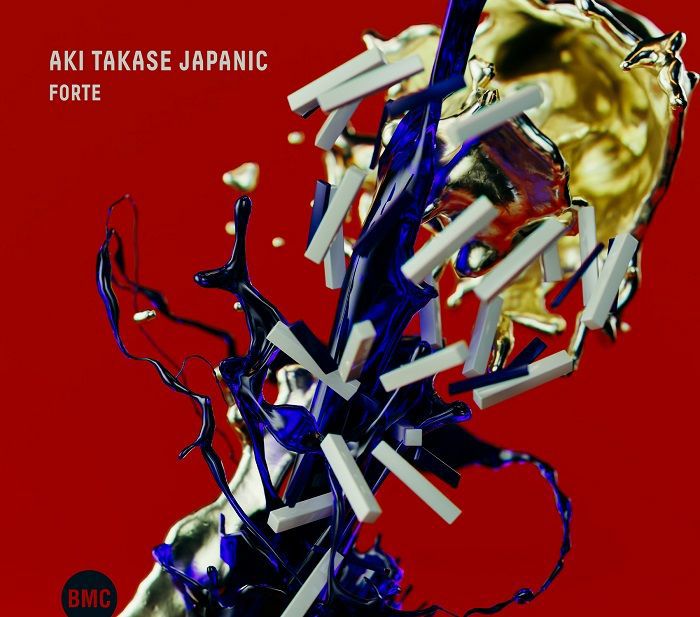‘Japanic’ is such a clever name for pianist Aki Takase’s latest group incarnation. A plausible synonym for ‘Japanese’ (Takase being Japanese by birth but domiciled in Berlin since 1988), it’s also a portmanteau that includes ‘panic’ – an apt word for the frenetic playfulness of this album and its predecessor Thema Prima (2019).
As listeners, we typically want an album review to answer the questions ‘Is it any good?’ and ‘What’s it like?’ The answer to the former is ‘Yes, it’s great! Do listen to it.’ The answer to the latter is trickier, but we get a clue from the line-up: Aki Takase (piano) Daniel Erdmann (tenor and soprano saxophones); Carlos Bica (double bass); Dag Magnus Narvesen (drums, percussion); and guest appearances from Nils Wogram (trombone), and pianist husband Alexander von Schlippenbach, with whom Takase has often duetted. So far, so conventional (although the spiky free jazz of a typical Takase/Schlippenbach duet is rarely conventional). What is unusual, though, is the addition of Vincent von Schlippenbach (Schlippenbach fils) on turntable.
Another clue to what this album is like is that one of Takase’s earliest collaborators (back in the seventies) was John Zorn. Listening to Forte reminded me of Zorn’s album Spillane (1987), in that both albums jump cut between different musical styles, and intersperse or overlay musical passages with sound effects. The final track of Spillane (‘Forbidden Fruit’) provides an early example of turntablism and manipulation of voice samples, and this too is evident on Forte – but made contemporary in how Schlippenbach fils brings elements of hip-hop to the mix, for example in the rhythmic stutter of vocal samples on ‘Step Skip Stop’, which follows on from a piano solo reminiscent of a classical avant-garde composer such as Ligeti. The turntablism is so impressively integrated with the acoustic jazz elements that it’s guesswork whether the effects come from post-production manipulation or spontaneous improvisation with the rest of the band.
As for describing the musical styles on Forte, that’s where it gets tricky because there’s so much going on. For example, ‘Festa Magdelena’ progresses from what sounds like water dripping in a cave combined with LP crackles, to sparse piano and subtle percussion, to ensemble playing of a folk-like tune, to mournful bass topped with fluttery soprano saxophone, continuing kaleidoscopically (kaleidophonically?) through various other styles and moods, including squealing free jazz and glitchy electronica, before a return to the folkish theme and a tight unison finish. And that’s just the first track.
There’s plenty of humour too. Take ‘Ma Non Troppo’, which starts as a comparatively conventional jazz ensemble piece but includes a comic interlude of musical anarchy, and prestissimo unison passages between piano and Daniel Erdmann’s soprano sax that feel like a riposte to the track’s title: ‘Not too much what? Speed? You mean slower than this?!’ And the vitality and precision of Takase’s playing belie the fact that she’s 76 (yes, seventy-six) years old.
The sense of fun and adventure is liberally scattered throughout the album. ‘Japanic Macrokosmos’ for example has all sorts of clever soundfoolery going on, including heavily processed tenor-sax tongue slaps (possibly), cosmic electronic bleeps like something from The Twilight Zone, furious drumming, an almost techno-like rhythm from turntablism and percussive clangs, and Monkish-like flurries on tenor sax and piano. Takase has said that Monk is a huge influence, and that’s easy to believe – although perhaps Monk as refracted in a funhouse mirror.
Given Takase’s free and experimental jazz credentials, widely displayed on this album and elsewhere in her discography, it’s slightly surprising that the closer is a relatively straight version of a standard published as early as 1930, ‘I’m Confessin’ (that I Love You)’. It’s a tune that’s been covered dozens of times, but given Nils Wogram’s wah-wah vocalised trombone and Takase’s Monkish piano, and a brief inclusion of vocal samples scratched and scuffed up like an old 78, I suspect that the performers Takase had in mind were Louis Armstrong and Monk. And given that as recently as this year Takase released an album of duets with saxophonist Erdmann called Ellington, Takase’s influences range across pretty much the entire history of jazz.
Overall, expect bracing, exciting, contemporary music spanning about a hundred years of jazz, and beyond. Is it music that’s easy to pigeonhole? No. Should you listen to it? Yes.



One Response
You certainly entice readers and jazz enthusiasts to give this album a listen or three. Will do!